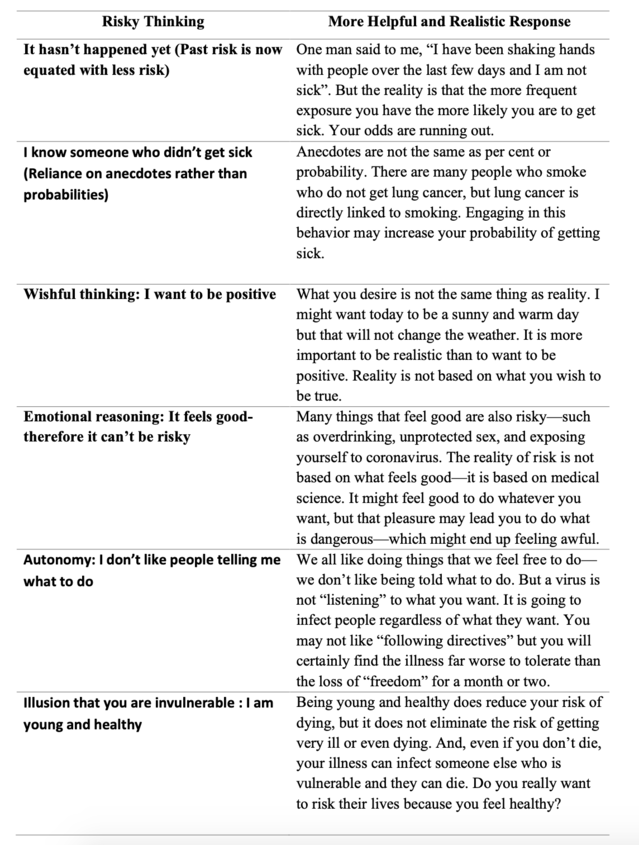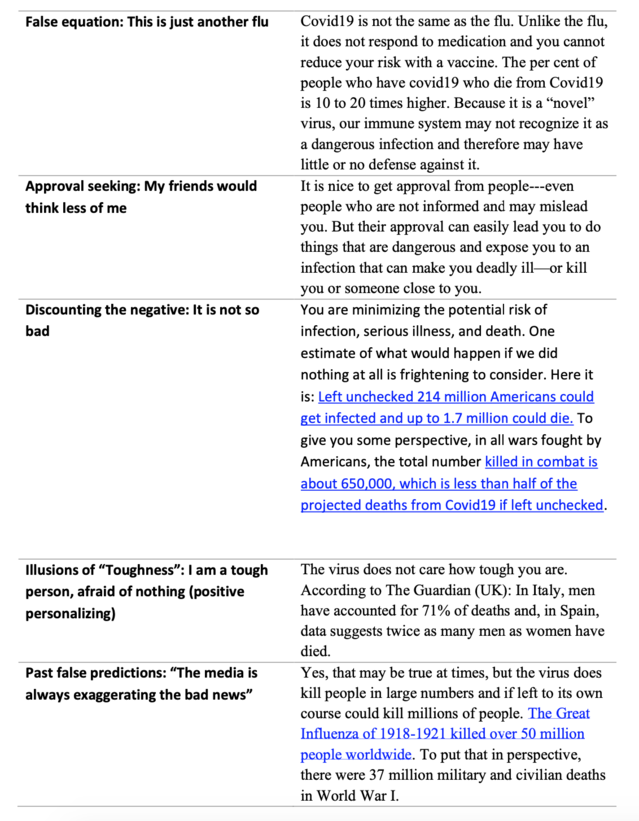Cognition
Why People Do Not Comply with Pandemic Guidelines
How to change risky thinking and behavior.
Posted April 16, 2020 Reviewed by Kaja Perina

Until we have reliable and extensive testing for antibodies and current COVID-19 or powerful and effective medications to treat COVID-19 or a vaccine that is administered to 300 million Americans, we have to rely on quarantine, social distancing, and intensive hygiene to slow the spread, flatten the curve, and give us time. Perhaps we will eventually develop herd immunity, but if we did not take any of these measures, the spread of the disease and the mortality rate that would follow would overwhelm all hospital systems and lead to one of the greatest losses of life during our lifetime.
Do the Guidelines Slow the Spread?
If you live in New York City, then you are familiar with the continual sounds of sirens as people are taken to the hospitals, many of whom may end up dying alone without the ability to say their last words to those they love. At 7 p.m. each night throughout New York City, people lean out of windows, cheering the workers who serve the health care system at great risk to themselves and they cheer the many underpaid delivery people and essential workers who keep us fed—and alive. It is a wartime feeling, a sense that we are in this together.
But do these guidelines work? You might think that wearing masks and gloves when you shop, physical distancing from others, obsessively cleaning down packages that you bring home or have delivered, and extensive hand-washing seems like a universal Obsessive-Compulsive Disorder. There still is resistance from a significant number of people. Why should you do these things?
The answer is that it will keep you alive and protect the people you come in contact with. And there is evidence. As many will recall, Washington State was one of the first hot-spots for COVID-19. We can look at the Reproductive Rate (Re) of the illness. In King’s County, Washington it fell from an estimated 2.7 to 1.4 within one month. Similarly, in a paper published by Jeffrey E. Harris for the National Bureau of Economic Research, these social distancing and hygiene recommendations have slowed down the spread in different communities nationwide. In addition, researchers at Columbia University in New York City estimate that decreasing social contacts by 40% could avoid 185,000 deaths in the Northeast and 33,000 deaths in the Midwest.
So, given the continued emphasis on compliance with CDC guidelines, state and federal directives, and the urging of Dr. Anthony Fauci on almost a daily basis, why is it that some people do not comply?
Who Doesn’t Comply?
In a study conducted by researchers at Stanford University last month, it was found that young people (between 18 and 31 years of age) were least likely to comply—only 52% complied. In fact, in mid-March, 40% of people were not complying. The most common reasons given for non-compliance were the belief that work required taking the risk, feeling cooped up at home, and feeling it was depressing not to have the opportunity to engage with others. In another survey conducted by the Harris Poll in March, seniors who are at most risk of dying from COVID-19 were the least informed and least worried.
Reasons for Non-Compliance
There are as many good reasons for complying as there are bad reasons for not complying. Let’s take a look at some common beliefs that underlie non-compliance and examine more helpful ways of thinking to encourage less risky behavior. (Indeed, I think we can generalize much of this to the high rates of non-compliance with health directives in taking medications, using tobacco, over-drinking, unsafe driving, and unprotected sex. There is a psychology behind underestimating risk. It is the Psychology of Risk Denial.)
I have taken the liberty to give examples of Risky Thinking in the left column and More Helpful Thinking in the right column. The reader may or may not agree that my comments are helpful, but I suggest that they are worth considering. After all, risky behavior might very well lead to ending up in the hospital on a ventilator, dying, or infecting and eventually killing someone you love.


Final Thoughts
Yes, social distancing, hygiene, staying at home, or being unable to pursue your dreams right now is frustrating. You are not alone. Those feelings come from a good place—the desire to live your life fully, to have freedom, and even to believe that you are safe. But your safety is not something that you can simply wish for—it is not dependent on your beliefs and emotions. It depends on medical realities. And your safety and that of others around you right now depend on your choices and your behavior.
You can make a difference. Making the right choice requires some sacrifice. But your life and those of others make it worth it.
References
References from Risky Thinking Table
1. "Left unchecked 214 million Americans could get infected and up to 1.7 million could die."
3. "The Great Influenza of 1918-1921 killed over 50 million people worldwide."


